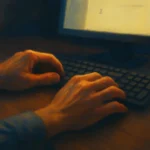The Compass That Broke: Rebuilding Trust After Betrayal
With insights from Dr. Gregory Jantz, Founder of The Center – A Place of HOPE
1. The Moment the Ground Split
It was the email that did it. Not the kind that rants or shouts in bold text. Just a few measured sentences, polite in their devastation.
He read them twice, thinking maybe the browser had cut something off. By the third read, his jaw ached from clenching.
The chair under him suddenly felt unstable. He leaned forward, elbows on his knees, phone in hand, as if more light on the screen might change the words.
Outside, traffic kept moving, tires hissing on wet pavement. Inside, his stomach dropped hard, like the floor had tilted.
The betrayal wasn’t loud. It was surgical. Precise. The kind of cut you don’t notice until you try to move and find you’re bleeding.
He sat back, staring at the wall. His mind replayed every conversation, searching for the lie he’d missed.
EFT – In the Shock of Discovery
(Karate chop point)
“Even though I can’t believe I didn’t see it coming, I’m open to giving myself some grace in this shock.”
(Sequence points)
“This frozen feeling.”
“My stomach’s in knots.”
“I keep replaying it.”
“I feel stupid.”
“Maybe I wasn’t meant to know then.”
“Maybe I can let my breath in, just a little.”
He didn’t tap yet. But somewhere in the back of his mind, he filed it away: breathe — even when nothing else feels safe.
2. The Descent
The next few weeks blurred into one long day. He woke each morning to the same weight in his chest, as if the betrayal had climbed into bed and stayed there.
Shaving became optional. Meals were whatever was in arm’s reach. Nights were the worst — lying in the dark while his brain pulled apart every moment, each “red flag” he’d smoothed over.
The inner voice was merciless: You saw the signs. You ignored them. You’re supposed to be smarter than this. Good luck trusting anyone again — including yourself.
One afternoon, aimlessly scrolling while the TV murmured in the background, he stumbled on an interview with Dr. Gregory Jantz.
“The actions of others do not measure your value,” Jantz said. “Healing starts when you separate what was done to you from who you are.”
It wasn’t hope—just a reminder that air still existed.
EFT – When Self-Blame Is Loud
(Karate chop point)
“Even though I can’t stop blaming myself for missing the signs, I’m open to believing I did the best I could with what I knew then.”
(Sequence points)
“This shame in my gut.”
“These endless replays.”
“I should have known.”
“I can’t trust my judgment.”
“I’m learning to catch new signals now.”
“I’m willing to take one step at a time.”
3. The First Small Anchor
The first shift was almost laughable: a glass of water. He filled it slowly, watching the swirl as it rose. It wasn’t thirst that drove him — it was a decision: I’ll do one thing for myself today.
He drank it in three gulps, then stood there at the sink, surprised at the faint steadiness in his legs.
That night, he opened a beat-up notebook and wrote: “I did one thing for myself today.”
Trust didn’t rush back. It hovered just beyond reach, like a dog deciding if it’s safe to come closer.
EFT – Allowing Small Steps to Matter
(Karate chop point)
“Even though it feels like a glass of water can’t possibly make a difference, I’m open to letting small acts count.”
(Sequence points)
“This is ridiculous.”
“It’s not enough.”
“I want results now.”
“Maybe this is how it starts.”
“Maybe tiny choices are worth something.”
“I can let them matter.”
4. The Practice
The next week, he picked one habit: putting his phone away an hour before bed. Some nights he nailed it — read a chapter of a book, fell asleep without the blue glow in his eyes. Other nights he caved, scrolling until his thumb cramped.
But when he kept the promise, the morning felt different. Not triumphant, but less fractured.
One night, closing the book, he found himself whispering, I choose steadiness.
It felt small, but solid. Like adding a brick back into a wall that had been kicked down.
EFT – Patience in Rebuilding
(Karate chop point)
“Even though I want this trust to come back faster, I’m open to being patient with myself.”
(Sequence points)
“This is taking too long.”
“I hate the slow pace.”
“I want to skip ahead.”
“I can still show up today.”
“I can build something steady.”
“I’m learning to trust me again.”
5. The Test
It came on a Tuesday. A coworker mentioned, in passing, that a decision had been made without him. Instantly, his body reacted — tight chest, heat crawling up his neck. His mind started writing the same old story: Here we go again. You’re out of the loop. Someone’s pulling something.
His first instinct was to swallow it, to move on. Instead, he remembered the glass of water. The phone put away at night. The small promises that stacked up like pebbles.
He felt his pulse, slow but present, and asked: “Could you walk me through how that decision was made?”
The explanation was mundane. His pulse, though, still thrummed—not from fear now, but from having spoken.
EFT – Speaking Up and Trusting Signals
(Karate chop point)
“Even though it’s scary to speak up, I’m open to trusting my signals and asking for clarity.”
(Sequence points)
“My heart’s pounding.”
“I don’t want to rock the boat.”
“I’m afraid I’ll regret saying something.”
“I can still ask the question.”
“I can stand by what I feel.”
“I’m learning to trust my own voice.”
6. The Reclaiming
Months later, he sat on the back porch, rain tapping on the roof. A mug of coffee warmed his hands. The betrayal still lived in his memory, but it no longer owned him.
His compass didn’t spin wildly now. It rested, steady enough to guide him, even on foggy mornings.
He’d kept dozens of small promises to himself since that first glass of water. Some days he felt like oak; other days, like raw timber. Both felt real.
He lifted the mug, let the steam brush his face, and smiled — not a showy grin, but the kind that comes from knowing you’ve kept yourself company through the worst.
One choice at a time. That was enough.
EFT – Owning the New Trust
(Karate chop point)
“Even though I still feel tender sometimes, I deeply appreciate how far I’ve come.”
(Sequence points)
“I can see my progress.”
“I’ve kept my promises.”
“My compass is steadier now.”
“I’m proud of myself.”
“I can trust me.”
“I can keep going.”



